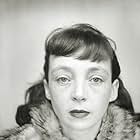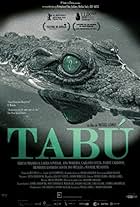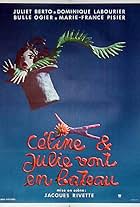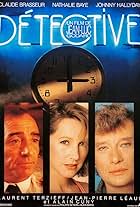En respuesta a las preguntas de un nuevo amigo, Vera relata su vida, comenzando con su marido, Jean, que no le ha servido para mantener a flote su fracasado negocio de construcción, hasta la... Leer todoEn respuesta a las preguntas de un nuevo amigo, Vera relata su vida, comenzando con su marido, Jean, que no le ha servido para mantener a flote su fracasado negocio de construcción, hasta la relación actual que tiene con Cayre (Depardieu).En respuesta a las preguntas de un nuevo amigo, Vera relata su vida, comenzando con su marido, Jean, que no le ha servido para mantener a flote su fracasado negocio de construcción, hasta la relación actual que tiene con Cayre (Depardieu).
- Dirección
- Guión
- Reparto principal
Noëlle Châtelet
- Monique Combes
- (as Noelle Chatelet)
Gérard Depardieu
- Michel Cayre
- (as Gerard Depardieu)
Marguerite Duras
- Narrator
- (voz)
- (sin acreditar)
Reseñas destacadas
One of the most unbearable Duras movies. With photography by Sacha Vierny, Delphine Seyring more languid than ever, and beautiful images of the coast. So far the positive part.
As many times with Duras, the problem starts with the text: ridiculous, empty, contrived, and so underlined by the style of the film that it seems that we are being shouted that it is art with capital letters.
Again the usual zombies chatting slowly and staring into space for what seems like an eternity.
A tribute to that intellectual kitsch of the time, with all the clichés and fashionable stereotypes about immature and cowardly men, empathic, profound and understanding women. Affected playing, stupid dialogues (that telephone conversation! With poor Perier shouting Vera!... Vera!), a dash of classy French eroticism (Vera naked with a pearl necklace), and a desolate and luxurious background of an uninhabited mansion with impressive windows to provide easy beutiful images.
Duras continues to have followers, although her film work is largely forgotten. Compared to the highly esteemed Robbe-Grillet, Sarraute, Perec... the literary work of this author is too many times of a badly repressed sentimentality, only tolerated by a style reputed for its conciseness and supposed precision (favorite word among the french critics of that time).
I must say about the music, which is ironically referred to by the characters as "outer turbulence": it plays continuously from the second scene, for almost 90 minutes, in an unbearable uniform rhythm. It's pretty at first, over the lonely beaches, the mansions, and the desolate mansion rooms. In the end it is already torture.
Her cinema is different, assumed to be targeted for a minority, with artistic flair, but that doesn't make it good.
Anyway this is far better than Le camion. For an increasingly select minority.
As many times with Duras, the problem starts with the text: ridiculous, empty, contrived, and so underlined by the style of the film that it seems that we are being shouted that it is art with capital letters.
Again the usual zombies chatting slowly and staring into space for what seems like an eternity.
A tribute to that intellectual kitsch of the time, with all the clichés and fashionable stereotypes about immature and cowardly men, empathic, profound and understanding women. Affected playing, stupid dialogues (that telephone conversation! With poor Perier shouting Vera!... Vera!), a dash of classy French eroticism (Vera naked with a pearl necklace), and a desolate and luxurious background of an uninhabited mansion with impressive windows to provide easy beutiful images.
Duras continues to have followers, although her film work is largely forgotten. Compared to the highly esteemed Robbe-Grillet, Sarraute, Perec... the literary work of this author is too many times of a badly repressed sentimentality, only tolerated by a style reputed for its conciseness and supposed precision (favorite word among the french critics of that time).
I must say about the music, which is ironically referred to by the characters as "outer turbulence": it plays continuously from the second scene, for almost 90 minutes, in an unbearable uniform rhythm. It's pretty at first, over the lonely beaches, the mansions, and the desolate mansion rooms. In the end it is already torture.
Her cinema is different, assumed to be targeted for a minority, with artistic flair, but that doesn't make it good.
Anyway this is far better than Le camion. For an increasingly select minority.
A dull monotonous Andean-like melody (or sort of) almost ruins this un-emotional account of the dramatic evolution of a couple. As an annoying never-ending loop the melody keeps on going for almost 85 minutes or so of projection, without any reason. It is supposedly the music partygoers are playing or listening to, and it can be heard from the beach to the forest in Thionville... I have nothing against Marguerite Duras' oblique way to tell stories (I love "Hiroshima, mon amour" and "Moderato cantabile", finely and respectively cinematized by Alain Resnais and Peter Brook), but as a filmmaker herself she could have spare us of this silly "score" and leave us with her fascinating world of words.
Who is Vera Baxter? This is the question the movie asks. There are many disputable facts, both due to differing viewpoints, but also because characters are lying either to themselves or to others. However, it seems reasonably clear that Vera is the wife of Jean Baxter, a man once heard in the movie, but never seen. Who is Jean Baxter? A rich man. The only certainties are those, he is a rich man, she is the wife of a rich man. These are the pins under which they live. True identity perhaps long lost in childhood.
Vera rests alone in an expensive house she is considering renting, in Thionville, and is visited by two women, the first a lover of Jean who is fascinated to know who Vera is, as Jean had often spoke of her, and an anonymous woman who became fascinated the name Vera Baxter when she hears it in a local bar. Names are very important in the movie, Vera grew up in the Arcangues, in south west France, at the conjunction of the Atlantic and the Spanish border. Scenes of the beach are shown throughout the movie, but Thionville is in Lorraine, in north eastern France. Thionville was known as Diedenhofen by the Germans, indeed had been inhabited by Germans for a millennium before annexation by France in the 17th Century. There followed a back and forth courtesy of the Franco-Prussian War, which left a French town but with many Neo-Gothic buildings (examples of which are shown in the movie). France has always been the feminine, and Germany the masculine in the French imagination. The best film exploration of this is Melville's Le Silence de la Mer.
Vera Baxter, the name is at once feminine and masculine. Baxter, so dominant and masculine a name, referred to women bakers in Anglo-Saxon times, but a few centuries later had been terminally co-opted as masculine. Vera is as feminine a name as I can think of. But the emphasis is on Baxter, repeated twice in the title. The Second Sex of Simone de Beauvoir appears to be a touchstone for this movie. Women have historically been defined as the "Other", that which is different from man, which revolves around man. Women still tend to identify themselves in reference to their social roles rather than their achievements in my experience. Vera Clouzot also springs to mind, that wonderful hyper-feminine actress who appeared only in the films of her husband. The male viewpoint is typified by the reported opinion of Jean Baxter that his wife's demeanour is one of docility, whilst the first woman visitor describes it as one of certitude.
Her first visitor mentions Vera returning to Arcangues briefly, describing it as "where people know you". She reports that her husband said that it was only possible to know Vera through desire. Perhaps she is only who she is during moments of passion. In any case none of this is shown in the movie, there is distance as much as anything. That is maybe the point, that her identity has been destroyed. This most heightened expression of this is when the second visitor, "l'inconnue", refers to a whole region of women deserted emptied when their husbands left for the crusades.
Something that I pondered on in the movie was that sometimes it's only possible for me to know other men via women. Men are so competitive and macho, and therefore reluctant to reveal themselves to one another, I can often only understand them by listening to their girlfriends, who are allowed to see them. Michel Cayre (Depardieu - present only at the beginning of the movie) dismisses the husband, only seeing about him that he is rich, therefore to be envied and despised. The only hint of who Jean Baxter might be comes from listening to Vera. I was very drawn in by this point and others, and I think Duras' technique aids this. Both in Detruire dit-elle, and here, I felt as if I were sat amongst the characters, here when Vera and "l'inconnue" are positioned around empty chairs that fill up half the frame, I felt as if I was being invited to sit down.
The sea, often used in contrast to the sky, or the mountains, as a feminine plays a large part in many of Duras' novels and films. Arcangues is by the sea, and the rhythm of the conversations is like the lapping of waves on the shore. Rhythm is important in the film and provides it with much of its allure, for most of the movie Chilean movie plays on a continuous loop. Some people have found this hard to handle, but I felt it removed much of the oppressiveness and inwardness that the film might otherwise have had. It was also a reminder that life is out there, even if it may be as far away as the other side of the Atlantic.
The film was also released under the title of "L'adultère", which in French can either mean adulterer or adulteress. For whatever reason and whatever truth (the movie suggests more than one), Vera appears to have given into the urge to sleep with another man not long prior to the start of the movie, which has provoked a sort of despair. Jean has had many affairs, but they're not treated in the same light, almost as if his are acceptable, as if a man's nature is to give his body freely, but a woman's to save her love for one man. The scenes during the credits I would suggest relate to this and are post-coital.
As a side note, Duras is uncredited as a cast member in the movie, but is an unseen participant in the first conversation of the movie.
Vera rests alone in an expensive house she is considering renting, in Thionville, and is visited by two women, the first a lover of Jean who is fascinated to know who Vera is, as Jean had often spoke of her, and an anonymous woman who became fascinated the name Vera Baxter when she hears it in a local bar. Names are very important in the movie, Vera grew up in the Arcangues, in south west France, at the conjunction of the Atlantic and the Spanish border. Scenes of the beach are shown throughout the movie, but Thionville is in Lorraine, in north eastern France. Thionville was known as Diedenhofen by the Germans, indeed had been inhabited by Germans for a millennium before annexation by France in the 17th Century. There followed a back and forth courtesy of the Franco-Prussian War, which left a French town but with many Neo-Gothic buildings (examples of which are shown in the movie). France has always been the feminine, and Germany the masculine in the French imagination. The best film exploration of this is Melville's Le Silence de la Mer.
Vera Baxter, the name is at once feminine and masculine. Baxter, so dominant and masculine a name, referred to women bakers in Anglo-Saxon times, but a few centuries later had been terminally co-opted as masculine. Vera is as feminine a name as I can think of. But the emphasis is on Baxter, repeated twice in the title. The Second Sex of Simone de Beauvoir appears to be a touchstone for this movie. Women have historically been defined as the "Other", that which is different from man, which revolves around man. Women still tend to identify themselves in reference to their social roles rather than their achievements in my experience. Vera Clouzot also springs to mind, that wonderful hyper-feminine actress who appeared only in the films of her husband. The male viewpoint is typified by the reported opinion of Jean Baxter that his wife's demeanour is one of docility, whilst the first woman visitor describes it as one of certitude.
Her first visitor mentions Vera returning to Arcangues briefly, describing it as "where people know you". She reports that her husband said that it was only possible to know Vera through desire. Perhaps she is only who she is during moments of passion. In any case none of this is shown in the movie, there is distance as much as anything. That is maybe the point, that her identity has been destroyed. This most heightened expression of this is when the second visitor, "l'inconnue", refers to a whole region of women deserted emptied when their husbands left for the crusades.
Something that I pondered on in the movie was that sometimes it's only possible for me to know other men via women. Men are so competitive and macho, and therefore reluctant to reveal themselves to one another, I can often only understand them by listening to their girlfriends, who are allowed to see them. Michel Cayre (Depardieu - present only at the beginning of the movie) dismisses the husband, only seeing about him that he is rich, therefore to be envied and despised. The only hint of who Jean Baxter might be comes from listening to Vera. I was very drawn in by this point and others, and I think Duras' technique aids this. Both in Detruire dit-elle, and here, I felt as if I were sat amongst the characters, here when Vera and "l'inconnue" are positioned around empty chairs that fill up half the frame, I felt as if I was being invited to sit down.
The sea, often used in contrast to the sky, or the mountains, as a feminine plays a large part in many of Duras' novels and films. Arcangues is by the sea, and the rhythm of the conversations is like the lapping of waves on the shore. Rhythm is important in the film and provides it with much of its allure, for most of the movie Chilean movie plays on a continuous loop. Some people have found this hard to handle, but I felt it removed much of the oppressiveness and inwardness that the film might otherwise have had. It was also a reminder that life is out there, even if it may be as far away as the other side of the Atlantic.
The film was also released under the title of "L'adultère", which in French can either mean adulterer or adulteress. For whatever reason and whatever truth (the movie suggests more than one), Vera appears to have given into the urge to sleep with another man not long prior to the start of the movie, which has provoked a sort of despair. Jean has had many affairs, but they're not treated in the same light, almost as if his are acceptable, as if a man's nature is to give his body freely, but a woman's to save her love for one man. The scenes during the credits I would suggest relate to this and are post-coital.
As a side note, Duras is uncredited as a cast member in the movie, but is an unseen participant in the first conversation of the movie.
i didn´t enjoy this movie. i like other films with similar proposals (long shots, slow cadence, extended silences, bresson-like acting...) i accept that M.Duras had a personal way to understand the cinema, but i didn´t enjoy this movie.
Depending on where you come across this film, you may see the genre label "mystery" used to describe it. This is, it turns out, the single best label. Here is a list of those things about this film that are not mysteries: the gentle, pleasant cinematography of Sacha Vierny; the lovely shot composition of filmmaker Marguerite Duras. The latter is bolstered by fetching production design, and excellent hair, makeup, and costume design. The filming locations are swell. And the single most clever thing that 'Baxter, Vera Baxter' does is to have the exact same song playing in the background for the entirety of the picture - and to have characters comment on it. I would love so much to say that I have more praise to offer here, or other remarks that are baseline positive. I don't.
To be honest, beyond those above aspects, things get murky. It's especially true in the entire first third of the feature, but continues to be a striking facet thereafter, that this often wants us to believe two (or more) separate and opposite statements are simultaneously true of the same thing. Or is there some major puzzle piece that I'm just not seeing? It sure seems to me as though the film is extraordinarily bad at identifying its characters - who they are, and what their relationships are to each other. This is especially true since Vera is spoken of in the third person even by people that she talks to, making me second-guess that the character identified as "Vera" actually is Vera. During the course of a conversation the dialogue may give two or more different impressions of who a supporting character is, or who they are in relation to Vera. Inanimate objects, and locations, receive the same treatment, being spoken of in conflicting ways even within the same conversation, and sometimes not being particularly identified at all. I spent an unreasonable amount of time watching unsure of the answer to basic questions of "who," "what," "where," or even "when" within each "scene."
I detect some story ideas in this. They range from "fair" to "great." I have a hard time believing that those ideas have been organized into a meaningful collection, let alone a singular plot, beyond what a one-line description might portend. "Might" is a key word, mind you, and the possibility of discerning "themes" is right out. Between that lack, the stated enigma that is the writing at large, and the very subdued tone, I'm not entirely certain that I can say the cast are acting. They're just sort of vaguely present. And I don't mean this as disparagement by any means; in the very least, I've seen Delphine Seyrig elsewhere and adore her. There are no nuances to pick up on in the portrayals, however: there is dialogue, and that's it. In fairness, during one slice of dialogue we get raised voices (heard, not seen), yet this is not a point in the movie's favor since the instances are grating on the ears for how they conflict with the soundtrack otherwise.
Someone, or possibly even multiple people, understand what Marguerite Duras was doing with 'Baxter, Vera Baxter,' and they appreciate this 1977 title. Indeed, I read other reviews and think, "Wow, they got a lot out of this, that sounds like something fantastic I'd like to watch." However, practically speaking, I can't entirely be sure that other reviewers were watching the same movie that I just did. I know that in the past I've had dreams that left me with a very different impression of this or that, some kernel of unknown knowledge that then wormed its way into my waking assumptions - assumptions which were, in turn, definitively not borne out by the actual experience. I have to wonder if this isn't how some have come to extract profound substance from Duras' picture. I've watched plenty of soft, low-key, arthouse, subtle, underhanded films and loved them. I get nothing at all from this, nothing except nice visual aesthetics and one inescapable (enjoyable) song. I'm glad for those who get more from it. For my part, I can't imagine recommending 'Baxter, Vera Baxter,' and I wish I had spent these ninety minutes on something else.
To be honest, beyond those above aspects, things get murky. It's especially true in the entire first third of the feature, but continues to be a striking facet thereafter, that this often wants us to believe two (or more) separate and opposite statements are simultaneously true of the same thing. Or is there some major puzzle piece that I'm just not seeing? It sure seems to me as though the film is extraordinarily bad at identifying its characters - who they are, and what their relationships are to each other. This is especially true since Vera is spoken of in the third person even by people that she talks to, making me second-guess that the character identified as "Vera" actually is Vera. During the course of a conversation the dialogue may give two or more different impressions of who a supporting character is, or who they are in relation to Vera. Inanimate objects, and locations, receive the same treatment, being spoken of in conflicting ways even within the same conversation, and sometimes not being particularly identified at all. I spent an unreasonable amount of time watching unsure of the answer to basic questions of "who," "what," "where," or even "when" within each "scene."
I detect some story ideas in this. They range from "fair" to "great." I have a hard time believing that those ideas have been organized into a meaningful collection, let alone a singular plot, beyond what a one-line description might portend. "Might" is a key word, mind you, and the possibility of discerning "themes" is right out. Between that lack, the stated enigma that is the writing at large, and the very subdued tone, I'm not entirely certain that I can say the cast are acting. They're just sort of vaguely present. And I don't mean this as disparagement by any means; in the very least, I've seen Delphine Seyrig elsewhere and adore her. There are no nuances to pick up on in the portrayals, however: there is dialogue, and that's it. In fairness, during one slice of dialogue we get raised voices (heard, not seen), yet this is not a point in the movie's favor since the instances are grating on the ears for how they conflict with the soundtrack otherwise.
Someone, or possibly even multiple people, understand what Marguerite Duras was doing with 'Baxter, Vera Baxter,' and they appreciate this 1977 title. Indeed, I read other reviews and think, "Wow, they got a lot out of this, that sounds like something fantastic I'd like to watch." However, practically speaking, I can't entirely be sure that other reviewers were watching the same movie that I just did. I know that in the past I've had dreams that left me with a very different impression of this or that, some kernel of unknown knowledge that then wormed its way into my waking assumptions - assumptions which were, in turn, definitively not borne out by the actual experience. I have to wonder if this isn't how some have come to extract profound substance from Duras' picture. I've watched plenty of soft, low-key, arthouse, subtle, underhanded films and loved them. I get nothing at all from this, nothing except nice visual aesthetics and one inescapable (enjoyable) song. I'm glad for those who get more from it. For my part, I can't imagine recommending 'Baxter, Vera Baxter,' and I wish I had spent these ninety minutes on something else.
¿Sabías que...?
- CuriosidadesThe Official DVD Site for this film describes it thus; "Vera Baxter is the name of a desolate, inconsolable, desperately idle woman. The title of the film, Baxter, Vera Baxter, describes her straitjacket: Vera is a prisoner of the name that marriage imposed on her. She's an incarnation of the bourgeoisie taken from social conformity, unfortunately linked to a (very ordinary) businessman for whom money is everything and desires not much. In the afternoon, Vera will be visited by an old mistress of her husband and then another woman, whose identity will not tell you anything, embodied by Delphine Seyrig. By withdrawing from the social game, perhaps Vera Baxter will finally become herself again, that is to say Vera; simply Vera."
- Citas
Monique Combes: We lie a lot, you and I.
Vera Baxter: A lot, yes.
- ConexionesFeatured in Women Make Film (2018)
Selecciones populares
Inicia sesión para calificar y añadir a tu lista para recibir recomendaciones personalizadas
- How long is Baxter, Vera Baxter?Con tecnología de Alexa
Detalles
- Duración1 hora 35 minutos
- Mezcla de sonido
- Relación de aspecto
- 1.66 : 1
Contribuir a esta página
Sugerir un cambio o añadir el contenido que falta

Principal laguna de datos
By what name was Baxter Vera Baxter (1977) officially released in Canada in English?
Responde






















